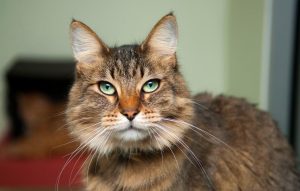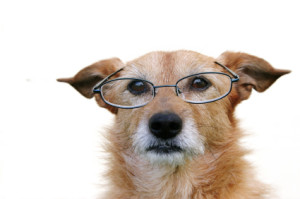Posts Tagged ‘aging pet’
Common Health Problems In Senior Cats
 With medical breakthroughs, cats have tended to increase their lifespan—especially the cats that are mostly indoor. But with these advanced years, other health related issues can crop up that can alter the health of your geriatric pet. Common health problems in senior cats include chronic kidney disease, dental disease, diabetes and others. But nationwide, as veterinarians, we have tended to see decreased visits from this age group.
With medical breakthroughs, cats have tended to increase their lifespan—especially the cats that are mostly indoor. But with these advanced years, other health related issues can crop up that can alter the health of your geriatric pet. Common health problems in senior cats include chronic kidney disease, dental disease, diabetes and others. But nationwide, as veterinarians, we have tended to see decreased visits from this age group.
A well-cared for indoor pet can live well into its teen years, while cats that go outside significantly reduce their odds. Most indoor cats can easily live to between 12 to 18 years. There is no set rule for when a pet is in its golden years, but they are considered seniors the last 1/3 of their lives.
The following will touch on a few of the common health problems that an aged cat faces after it becomes geriatric.
Dental Disease
Most cats have some form of gum disease by the age of 2, primarily because they don’t receive any home or professional dental care and they don’t show any pain or discomfort until the disease is advanced. While treatments usually start at about $400, regular dental care can reduce the cleaning bill. Good dental hygiene can also prevent other issues. There are also a number of painful conditions of the mouth that are dramatically increased in the older pets. This means that proper dental care is extra important. Daily homecare and professional cleanings are required by your veterinarian as the best way to keep your cat’s mouth healthy and disease free. These are important with cats with chronic issues like kidney failure, heart disease and diabetes. Due to the fact that the oral cavity is very vascular, systemic infections that affect the heart, liver and kidneys can arise.
Arthritis
Cats get arthritis just like dogs and there are fewer medical options available because cats metabolize at a much slower rate. But that doesn’t mean that they have to endure pain. Studies have shown that as much as 90 percent of cats that are 12 years or older have some degree of arthritis which is a long term and permanent deterioration of cartilage around the joints. It is important to keep your cat at a lean healthy weight and make sure that they get exercise and daily activity to prevent muscle weakness and preserve muscle tone.
Chronic kidney disease
Disease affecting the kidneys is a common affliction in older cats. Essentially the kidneys act as a filter system to filter the wastes products out of the blood system that the body has produced. When the disease affects the cats, it can make the cats more prone to urinary tract infections and the cat may consume more water and urinate more. Clinical signs also may include lethargy, vomiting, inappetence, and weight loss. While there is no cure for kidney disease, there are low protein and low phosphate diets available that can help by giving the kidneys less work to do. Early detection can also allows veterinarians to slow the progression of symptoms.
Hyperthyroidism
Though it may seem a good thing, an excessive appetite and increase in energy could be clues that your geriatric cat may have developed hyperthyroidism which is a condition in which the thyroid gland produces greater levels of thyroid hormone than necessary. Cats with hyperthyroidism are also more prone to hypertension which can contribute to kidney failure and heart disease if the condition goes untreated. If you suspect your cat may have hyperthyroidism, schedule a visit with your veterinarian for blood work and to discuss treatment options.
Hearing Loss
Even with cats, the sense of hearing begins to go with age. If you suspect your cat isn’t hearing as well as he used to, monitor his behavior. Signs of diminished hearing may include sleeping more soundly than usual or seeming to ignore noise that used to bring him running. You can’t purchase hearing aids for your pet yet, but you still can communicate with him. Teach him hand signals, stomp your foot, so he feels the vibrations and knows that you are nearby, or use time-honored methods to alert him that it is dinnertime. Cats with hearing loss should never be left outside unsupervised. If your cat is used to wandering the neighborhood, it is time to confine him to a secure enclosed area on a patio or a porch.
Failing Vision
Cataracts, glaucoma, and retinal detachment are among the eye conditions that can affect geriatric cats. Look for signs such as cloudiness or whiteness of the lens, general cloudiness of the eye, dilated pupils, or bumping into things. Medications can help depending on the type and severity of the problem. Cataracts can be removed surgically, but cats typically get around well using their sense of smell, so it is usually not necessary. Just remember not to move the furniture around.
Cancer
Since thirty percent of all cats 10 years of age and older are diagnosed with cancer at some stage of life, it is no surprise that cancer is on the list. There are many types of cancer that affects cats but one of the most common is Lymphosarcoma. Take your pet to your veterinarian immediately if you notice clinical signs like weight loss, lumps or bumps, appetite loss, sores that don’t heal, bleeding, or any unusual symptoms that might persist. Symptoms are dependent on the type of cancer involved.
One of the blessing of cats is that age seems to creep up on them gently—so much that it may be difficult for us to notice that they really are older and have developed some of the common health problems associated with aging. Though some conditions are inevitable with advanced age, there are ways that you and your veterinarian can work together to help your cat stay comfortable and contented for as long as possible. So if you feel that your cat is having some issues, please don’t hesitate to call us at (618)-656-5868, or contact us here.
Tips For Taking Care of Your Aging Pet
 Regular professional veterinary care is essential to the health of your older pet. Not since your pet was a puppy or kitten have regular check ups and vaccinations been so important. Preventive veterinary care can add years and quality to the life of your older pet. Consider yourself, your pet, and your veterinarian and staff a team whose main goal is to keep your pet happy, healthy and in a loving relationship with your for as long as possible.
Regular professional veterinary care is essential to the health of your older pet. Not since your pet was a puppy or kitten have regular check ups and vaccinations been so important. Preventive veterinary care can add years and quality to the life of your older pet. Consider yourself, your pet, and your veterinarian and staff a team whose main goal is to keep your pet happy, healthy and in a loving relationship with your for as long as possible.
Dogs and cats are living longer than ever and that phenomenon is directly related to the fact that today people take such good care of their animals. Important changes affecting 85% of pets today, with a focus on nutrition, rapidly advancing veterinary care and loving environments are responsible for the life expectancy of animals to be extended, in general, a five years longer across the board than was previously the norm. The human-animal bond is strong. Many people today take fantastic care of their pets and have educated themselves on the best protocols for these important friends. Every aspect of how to care for the family pet is considered in terms of diet, vacations, exercise, entertainment, grooming, wellness comfort, aging and more.
Three important aspects of the aging pet we consider are:
Diet: Obviously starting early is important. Two things can happen to the aging patient: becoming either over or under weight. It is easier to prevent a pet from being overweight than it is to diet him but we are successful at helping the committed owner who wants to help their pet lose weight. This involves selecting the correct snacks, as well as the appropriate food. The underweight and aging pet can be a bit more of a challenge and the underlying causes must be diagnosed but in most cases we can help clients maintain a healthy weight in the elderly pet. One of the most important aspects of diet in the geriatric pet is being aware of the changes going on with respect to his or her vital organs and metabolism and selecting the best diet, supplements, and snacks for his or her particular condition.
There are several prescription foods available that directly target the aging brain. We would be happy to discuss and make recommendations of the excellent choices that are out there.
Preventative Care: As you are aware, pets are very stoic in the face of considerable disease and one of the difficult aspects of care in veterinary medicine is the fact that we ofter do not see the pet until a disease process is very advanced. A well-thought out and followed preventative plan is a great way to minimize testing and monitoring and can offer tremendous insight to what is going on inside the pet. There are medications available that target the diseases and changes that adversely affect the older patient and we can guide you toward those after an evaluation that will tell us if your pet is in need of preventative care.
It is very comforting to pet owners when an elderly patient has a normal physical exam and consult, blood pressure, ECG, and urinalysis. We ask specific questions to discern if there are subtle changes in the animal that might lead us to want further diagnostics.
Exercise: Exercise should be maintained for the elderly patients. Did you know that 15 minutes 3 times per week of forced exercise will go a long way in maintaining a healthy metabolism in your friend? As with diet, exercise should be implemented at a young age and adjusted as the pet ages.
Cognitive function can be supported in the geriatric pet with specific supplements and there are medicines available if your friend is found to be in need. Antioxidants, healthy fats, and pain medications can keep the old aches and pains away just like us! Certain activities and ideas to encourage the older pet and suggestions to protect them, especially when he or she is alone, are available if your need them.
Older pets need regular veterinary care to prevent disease and/or diagnose it early in its course. Many veterinarians have special programs to monitor dogs in their later years of life. Good communications between the owner, dog and veterinarian can keep the pets healthy and make their senior years to be wonderful years. At the end of your pet’s life, your veterinarian can help you in making decisions, provide support, understand and share your grief and celebrate, with you, the life of your pet.
As always, the health of your pet is of utmost importance at our office. Please CONTACT US if you have any questions.
